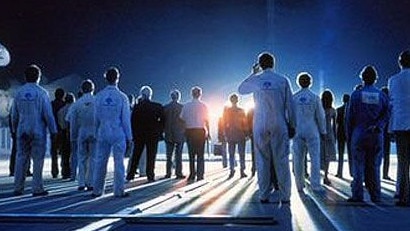
The Boston-based Friend has just closed off his latest funding round securing $US250m ($360m) for his five-year-old Wasabi Technologies cloud storage business. With tech valuations crashing everywhere, Friend’s Wasabi has defied gravity. Through the funding round it increased its valuation to now edge out $US1.1bn and a stock market listing is very much in the frame.
A relative newcomer taking on a global market currently dominated by tech giants Amazon, Google, or Microsoft to many would seem crazy, but Friend reckons it’s just good business.
With the vast volume of information created every day, data storage is an almost “infinite” market, he says, with trillions dollars in revenue up for grabs when it comes to storing all the world’s data. And because he sells one thing – safe data storage – he can undercut big rivals on price.
“It’s kind of a classic disruptive business strategy. There’s not really anything sensible that any of the hyperscalers can do about us, because it would be irrational, to try to drop the price to compete with us,” Friend tells The Australian.
“The way investors look at it – at least what I try to convince them – is that there’s no point at which Wasabi is going to hit a wall. There’s a lot of companies that operate in a $5bn market and they get to $1bn, and they really can’t grow any more than that, because they’re dealing with a limited market”.

But Friend, a self-described serial entrepreneur, says the only thing standing in the way of getting to a 10 per cent slice of the market is the prospect of tough competition from Amazon, Google and Microsoft.
“Of the 300 or so products that Amazon sells, you know, probably 290 of them are software products, they’re not infrastructure, and we see ourselves as just to get infrastructure that people want”.
“The reason people go to Amazon is because they want to build a complete application, they want to take advantage of blockchain or facial recognition, or analytics, or all the other things that Amazon offers. And the storage kind of comes along for the ride”
“For Amazon to drop their price to compete with us would wipe more than $US20bn off their top line. It wouldn’t make any sense to do that, considering our size. We’re not even a rounding error for those guys”.
Just a utility
Friend, who spent several years living in Sydney, doesn’t attempt to glamorise the world of digital storage. For him the cloud is just a utility.
“It doesn’t matter whether you’re storing police body cam data, or images of the night sky from a telescope in Chile, or surveillance data from the mall, or backups. It’s just storage and it needs to be fast, cheap, and easy and safe. And that’s about it”.
He believes we are at the very beginning of this massive migration of digital storage where he expects by the end of the decade nearly all of the world’s data is going to reside in the cloud. Compare this to just 10 years ago when all the world’s data was stored on site.
In Australia high profile cyber security breaches in recent months at companies like Optus and Medibank, have put cyber security top of mind for boards. But Friend says it is a myth that the cloud is less secure than companies operating with their own data centres. He says 99 per cent of companies still running their own infrastructure are more vulnerable to attacks.
“They just don’t realise it because they think because the equipment is sitting right there. Inside their building, somehow it’s more secure. But it’s still connected to the internet.”
“Cloud storage is a lot safer than on-premise storage. You just don’t have a bunch of PhDs sitting around worrying about security like we do”.

Beyond the high profile leaking of customer details, the bulk of ransomware attacks often involve threats to destroy data or shut down systems that can cripple organisations. Friend has responded to this with the world’s first immutable cloud storage. He compares this to a nuclear missile launch process where two people have to turn a key at the same time in order to modify data.
“Basically it’s a container for your information, and you declare that bucket to be immutable, for some period of time any data that you put in there cannot be altered or deleted by us, or the customer, or anybody else”.
“This is incredibly effective at preventing ransomware attacks, because the ransomware guys figured out a long time ago that once they get into your network through phishing, or some other way, they have to destroy your backups at the same time. If you could restore your backup, and get back in business, why would you pay the ransom?”
Serial entrepreneur
Wasabi is Friend’s seventh company he has had a hand in starting. Other companies include a fax to email start-up, another was one the first to use the internet to deliver video conferencing.
Most recently he launched a consumer PC software back-up player Carbonite and saw this through to a Nasdaq listing before retiring in 2015. This was ultimately acquired in 2019 for $US1.4bn by Nasdaq listed OpenText Corp.
He acknowledges the shake-out in tech underway but much of this is around social media, where there is a degree of pushback on the business from users. Advertising funded tech growth is undergoing a temporary slowdown with economic disruption. But the trend for tech spending by business is only set to increase.
Friend studied at Yale where he majored in music composition, but he quickly realised he “was never going to survive” doing songwriting and went back to study engineering at Princeton University.
It was there he had an opportunity to combine the two fields and was involved in co-founding a company with another engineering student Alan Pearlman called ARP, that broke new ground making big sounding synthesisers. Friend then spent the 1970s chasing names like The Who, Stevie Wonder, Herbie Hancock, Led Zeppelin and hundreds of others to use the ARP technology.

Wonder was an early adopter of the ARP 2600, which was the sound backing in a number of hits through the 1970s. Another ARP synthesiser was featured in the Steven Spielberg 1977 hit movie Close Encounters of the Third Kind.
“If Stevie Wonder had a hit on your synthesiser, every high school rock band wanted to go out and buy the same instrument. So I spent a lot of time hanging around recording studios, waiting for the band to show up,” Friend says.
At the time the sound was new and he points out synthesisers had the ability to make their own sound with them.
“They were completely adjustable, so to speak. They were capable of making a virtually infinite number of new textures that, you know, you couldn’t make with acoustic instruments, and started to find their way into pop music until they became kind of standard and every band in the Holiday Inn hotel would have one”.
Now Wasabi has had several years of fast paced growth, now pushing 300 employees around the world with data centres in 13 countries, including Australia. It has nearly 50,000 customers. Funds from the recent raising will be put to helping to build out distribution, an area often overlooked in tech.
“Getting an idea out there takes a lot more money than the development. You know, for every dollar that we spend on R&D, we probably spend three on marketing”.
“People can develop the technology, there’s no secret to it, however it takes a lot of experience to know how to do it at scale. But building the distribution is just something that takes a lot of money. And a lot of time, there’s no way to shortcut it. I’ve always used capital, as, as a weapon that you can use to protect yourself against competition, if you get bigger, faster”.

Even with tech values crashing prompting some private companies to rethink about moving to a stock market listing, Friend says it’s an important step in a company’s life cycle.
“We want to sell storage to the largest enterprises in the world. And when you go public, one of the things I learned at Carbonite is the world perceives you differently.
“You’re no longer viewed as a start-up … you get a certain stamp of approval, so to speak, to sell to the bigger enterprises and your financials become public record. Somebody can look at you and they say ‘this doesn’t look like a company that’s gonna go out of business anytime soon so we can take a chance with them”.
“I know at Carbonite our business was helped greatly when we went public. It just gave us so much great ability in the marketplace”.
johnstone@theaustralian.com.au




It’s a long arc between Stevie Wonder’s pounding synthesiser of the ’70s or the eerie five notes from the film Close Encounters of the Third Kind to riding a tech unicorn in 2023 but David Friend can be found at both ends.